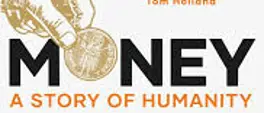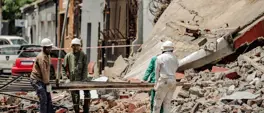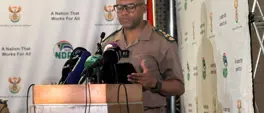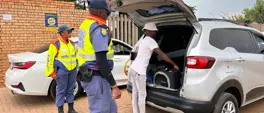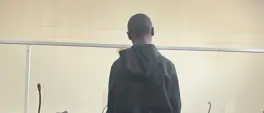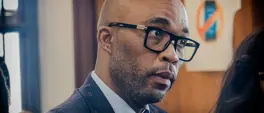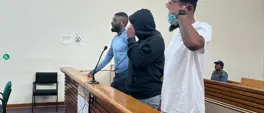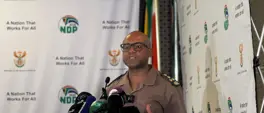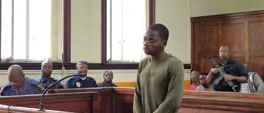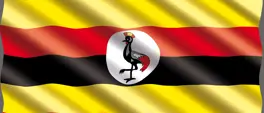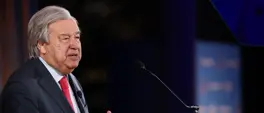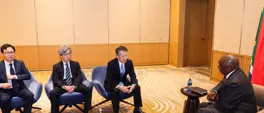Rwanda, DRC to ink peace deal in US but questions remain
AFP
27 June 2025 | 3:46The agreement has also come under scrutiny for its vagueness, including on the economic component, with the Trump administration eager to compete with China and profit from abundant mineral wealth in the long-turbulent east of the vast DRC.
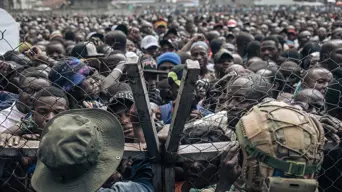
A man crosses a road during heavy snowfall in Seoul on 6 February 2025. The M23 armed group and allied Rwandan forces launched a new offensive on Wednesday in the eastern Democratic Republic of Congo, days before the Rwandan and Congolese presidents are due to attend a crisis summit. Picture: AFP
WASHINGTON - Rwanda and the Democratic Republic of Congo will sign an agreement in Washington on Friday to put an end to a conflict in the eastern DRC that has killed thousands, although broad questions loom on what it will mean.
President Donald Trump has trumpeted the diplomacy that led to the deal and publicly complained that he hasn't received a Nobel Peace Prize.
But the agreement has also come under scrutiny for its vagueness, including on the economic component, with the Trump administration eager to compete with China and profit from abundant mineral wealth in the long-turbulent east of the vast DRC.
The M23 rebel group in late 2021 launched a new offensive that it escalated sharply early this year, seizing broad swathes of territory, including the key eastern DRC city of Goma.
The Kinshasa government has long alleged that M23, consisting mostly of ethnic Tutsis, receives military support from Rwanda. These claims are backed by Washington.
Rwanda has denied directly supporting the rebels but has demanded an end to another armed group, the Democratic Forces for the Liberation of Rwanda (FDLR), which was established by ethnic Hutus linked to the massacres of Tutsis in the 1994 Rwanda genocide.
The Rwandan and DRC foreign ministers will sign the agreement in Washington in the presence of Secretary of State Marco Rubio, State Department spokesman Tommy Pigott said.
The White House also said Trump will meet the foreign ministers in the Oval Office.
In a joint statement ahead of the signing, the three countries said the agreement would include "respect for territorial integrity and a prohibition of hostilities" as well as the disarmament of all "non-state armed groups."
The agreement was mediated through Qatar, a frequent US partner, and Massad Boulos, a Lebanese-American businessman and father-in-law of Trump's daughter, Tiffany, tapped by the president as a senior advisor on Africa.
The statement also spoke of a "regional economic integration framework" and of a future summit in Washington bringing together Trump, Rwandan President Paul Kagame and DRC President Felix Tshisekedi.
CONTROVERSY OVER ECONOMIC TIES
Denis Mukwege, a gynaecologist who shared the 2018 Nobel Peace Prize for his work to end the DRC's epidemic of sexual violence in war, voiced alarm that the agreement was too opaque.
He said that the talk of economic cooperation was an unjust reward for Rwanda.
The deal "would amount to granting a reward for aggression, legitimising the plundering of Congolese natural resources, and forcing the victim to alienate their national heritage by sacrificing justice in order to ensure a precarious and fragile peace," he said in a statement.
On the eve of the signing, news outlet Africa Intelligence reported that the deal asks Rwanda to withdraw its "defensive measures" and for the DRC to end all association with the FDLR.
Rwandan Foreign Minister Olivier Nduhungirehe on X denied the account.
"As a matter of fact, the words 'Rwanda Defence Force', 'Rwandan troops' or 'withdrawal' are nowhere to be seen in the document," he said.
Congolese Foreign Minister Therese Kayikwamba Wagner, on a visit to Washington in April to jumpstart negotiations on the deal, said that Rwanda should be obliged to withdraw from her country, which has been ravaged by decades of war.
Both countries have sought favour with the United States. The DRC - whose enormous mineral reserves include lithium and cobalt, vital in electric vehicles - has pitched an agreement to seek US investment, loosely inspired by the Trump administration's minerals deal with Ukraine.
Rwanda has been discussing taking in migrants deported from the United States, a major priority for Trump.
Rwanda, one of the most stable countries in Africa, had reached a migration deal with Britain's former Conservative government, but the arrangement was killed by the Labour government that took office last year.
